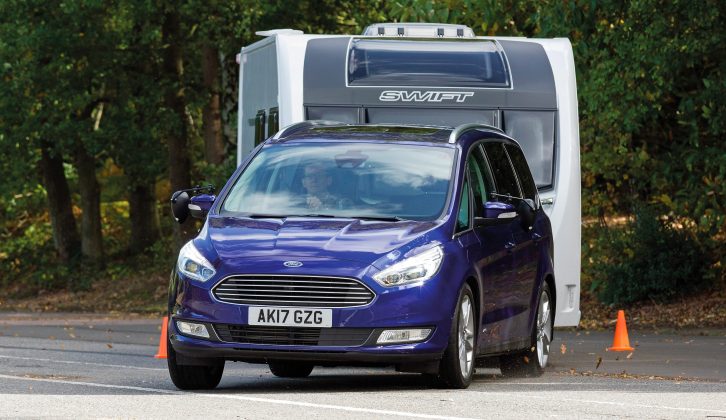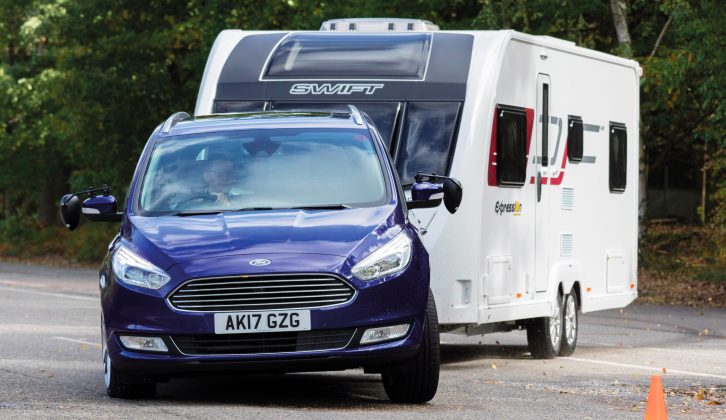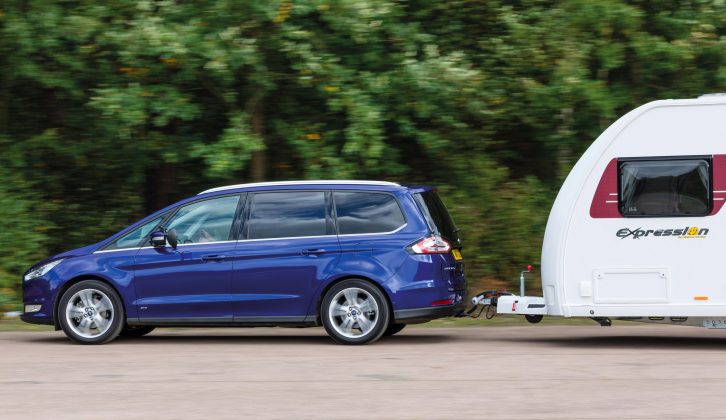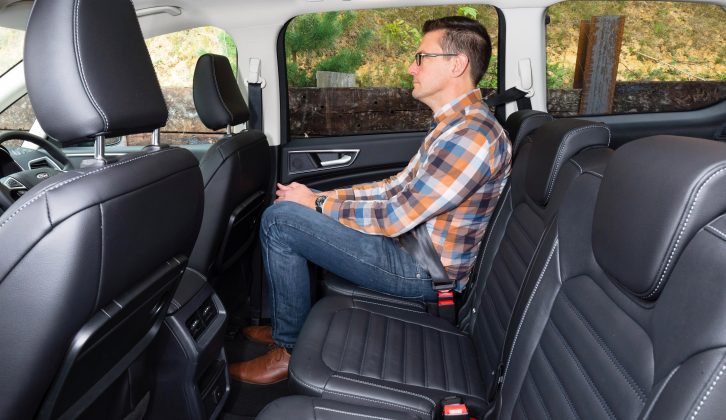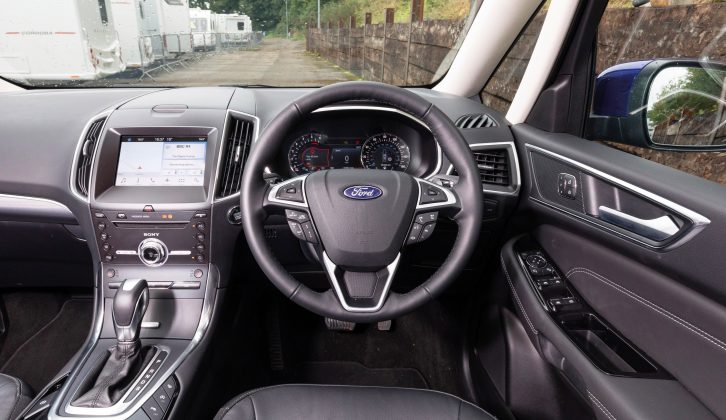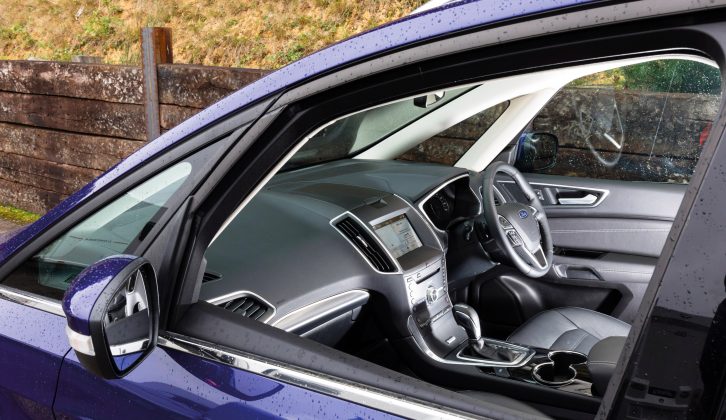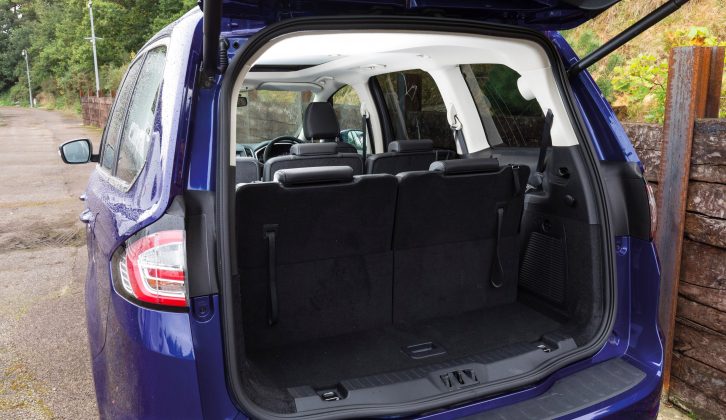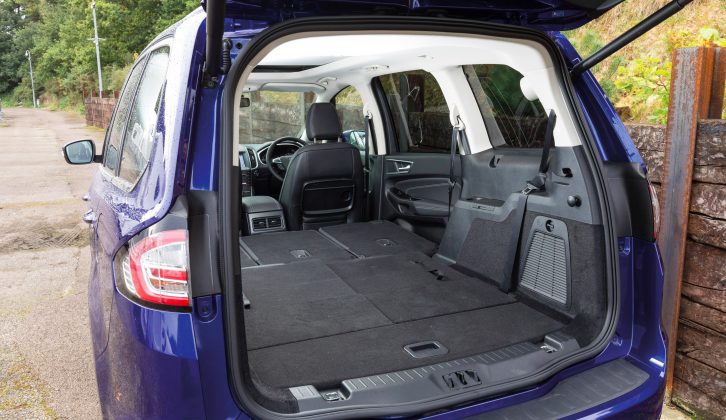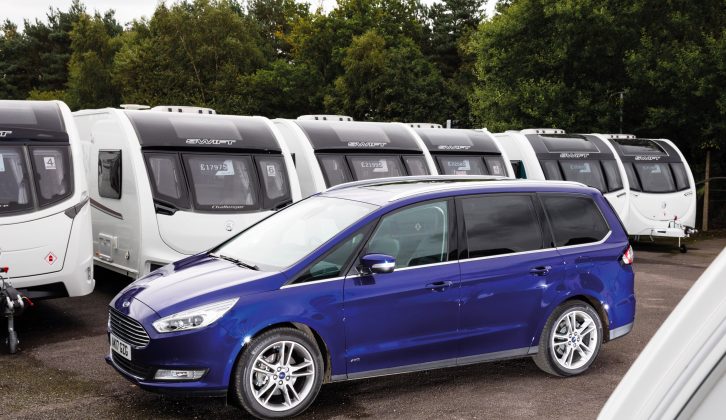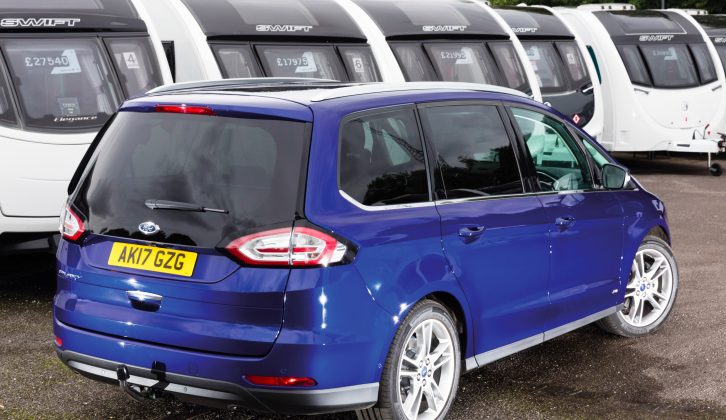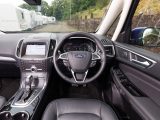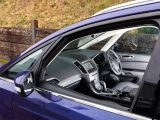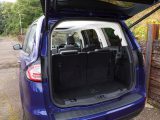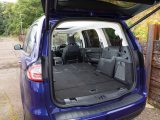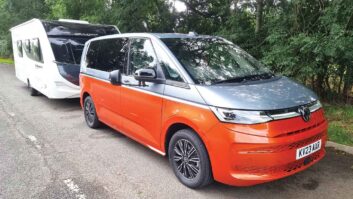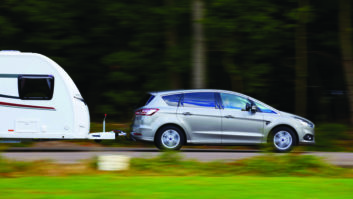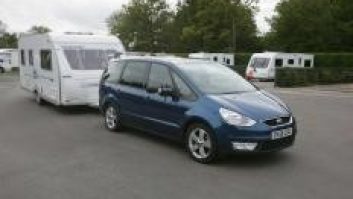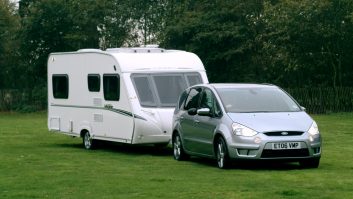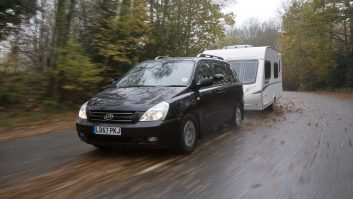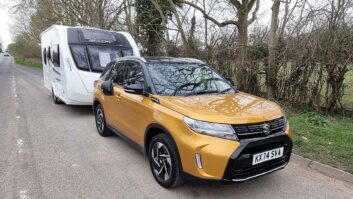Verdict
If we were a car magazine assessing the Ford Galaxy, we’d advise against buying this version.
Titanium X models are loaded with toys, but choosing the more affordable Titanium spec is hardly slumming it.
And for regular school run and commuting duties, the extra cost and inferior economy of the 4×4 don’t really add up.
For caravanners, though, you can make a case to justify the range-topping Galaxy.
The extra weight of the four-wheel-drive hardware helps matching ratios and lets the Ford pull away smartly without spinning its wheels and should get you out of trouble when leaving a damp, grassy pitch.
The 2.0 TDCi 180PS engine works well when towing, combining sufficient poke to pull a twin-axle caravan with reasonable economy and refinement.
What’s more, the Galaxy is largely a stable tow car, although it is susceptible to strong crosswinds.
MPVs may be out of fashion compared with SUVs, but the Galaxy’s practicality is a good reason not to follow the herd.
There’s lots of space in the front two rows, and even the third row offers enough room for adults at a push.
And if you start folding away the seats, luggage space is very generous.
Resale values are modest, but that’s offset to some extent by healthy discounts.
Fuel economy is acceptable and you get a very high level of kit.
So as a tow car is the Ford Galaxy 4×4 a genuine alternative to an SUV?
If space and practicality matter more to you than image, then yes it is, which has prompted us to include it in our guide to the best used tow cars.
Pros
It’s a practical seven-seater
The 2.0-litre diesel engine and automatic gearbox are a great combination
Four-wheel drive is an advantage when towing
It proved to be a strong tow car
Cons
There was some shoving from the caravan at the legal limit in the lane-change test
Some of the cabin materials don’t befit a near-£40k car
Resale values are relatively poor
This big Ford Galaxy has been on the Practical Caravan long-term test fleet, and in this spec it’s that rare thing: an MPV with a spacious, flexible cabin and with the traction of a 4×4.
Our car has Ford’s 180PS (178bhp) 2.0 TDCi engine, which should be strong enough to tow a suitably matched tourer.
It also has the Powershift twin-clutch automatic transmission.
This engine and gearbox combination is only available in high-spec Titanium X trim, and costs £38,645.
So, what are we looking for?
Most buyers looking for a seven-seater at this price point end up with an SUV rather than an MPV.
Does the Ford Galaxy 4×4 o ffer a worthwhile alternative? And what tow car ability does it have?
Let’s hitch up and find out!
MPVs may be out of fashion compared with SUVs, but the Galaxy’s practicality is a good reason not to follow the herd
Towing
Aside from the obvious benefit of extra traction in wet and slippery conditions, the Ford Galaxy’s 4×4 system also pushes up the car’s kerbweight.
The manufacturer quotes a figure of 1841kg for this model, some 81kg heavier than the front-wheel-drive version and not far shy of the weight of big 4x4s such as the Kia Sorento.
A few seconds with a calculator will tell you that makes for a healthy 85% match figure of 1565kg. That’s well within the 2000kg legal towing limit.
The 2.0-litre engine produces a useful 178bhp at the top of the rev range, but the 295lb ft of torque delivered from 2000rpm is more important.
It’s enough for confident performance, as we discovered while towing a Swift Expression 620 with a MiRO of 1461kg.
The Galaxy held speed well on steep hills without needing a flurry of gear changes.
Instead, the Powershift gearbox would drop one or two ratios then use the engine’s torque to sustain a healthy pace uphill.
There’s enough punch for decisive overtaking, too. With the gearbox in sport mode, the Galaxy accelerated from 30-60mph in 12 seconds.
That’s brisk rather than outright quick, but it’s fast enough to suggest the Galaxy would be unfazed by towing a heavier tourer.
If anything, the car’s braking is more impressive than its acceleration. It took just 10.2 metres for car and caravan to stop from 30mph.
The electronic parking brake had no trouble holding the outfit still on the 1-in-10 slope we use for our hill-start test, and it released smoothly as the driver applied the throttle.
The combination of a strong engine, the Powershift gearbox and four-wheel drive helped the Galaxy to pull the caravan to the top of the incline without fuss.
Sending power to all four wheels is a plus in all sorts of situations, not just a hill start.
It doesn’t have to be wet or slippery under the car’s tyres, either.
Compared with the front-wheel-drive VW Sharan, the Galaxy pulled away from junctions more cleanly, whereas the Sharan was prone to wheelspin even in the dry.
Once up to speed, the Galaxy feels stable, although in really strong winds, there was some side-to-side movement from the van.
It never felt likely to get out of hand, but it was noticeable. In still air, though, all was calm.
For the most part, the Ford handled the lane-change test well, helped by precise steering and well-judged suspension.
However, as speeds increased, we could feel a little pushing and shoving from the caravan.
Everyday Driving
So, we know what tow car ability this MPV has, but what is it like in every day life?
Car manufacturers tend to load their press fleet cars with every conceivable extra, and that often includes adaptive damping systems which tailor the suspension to suit different roads and driving styles.
In some cars, these systems work well, in others, the driver seems to have a choice between a ride that’s either too hard or too soft.
The Galaxy does without any adaptive trickery, and frankly, it doesn’t need it.
Ford’s engineers have done things the old-fashioned way, simply honing the car’s springs and dampers to deliver comfort and control across a wide variety of road conditions.
Sharp bumps at low speeds are absorbed well, to an extent that makes you wonder if the suspension will allow too much movement at high speeds.
But for such a big, tall vehicle, body movements are kept well in check.
It’s not as sporty as the slightly smaller Ford S-Max, but if you want your passengers to be comfortable on all kinds of journey, the Galaxy is for you.
Without the weight of a caravan to tow, performance obviously jumps up a notch.
The Galaxy will shift along at a healthy rate if required, even if you’re giving a lift to a five-a-side team.
The engine stays smooth and reasonably quiet when put to work, too.
There’s some wind and road noise at speed, but the Galaxy is quiet enough to make a fine long-distance car.
Around town, there’s no getting away from the Galaxy’s size, but all-round visibility is good, helped by the slim front pillars.
The steering is light enough for easy parking.
We’re impressed with how well the Ford Galaxy keeps driver and passengers happy.
And the Galaxy is solidly built, but some of the cabin materials used don’t feel especially upmarket for car that costs close to £40,000.
Space
There’s loads of room in the Galaxy, and that space has been put to good use.
Up front, the driver and front seat passenger have plenty of leg- and headroom, even with the panoramic sunroof fitted to our test car.
There’s lots of space in the middle row, too. Legroom is generous, as long as the seats are positioned all the way back on their runners.
The outer seats are set wider than those in the front, so passengers look past those in the front rather than squarely at the back of their heads. A small point, perhaps, but a benefit for anyone prone to car sickness.
As you’d expect, seats six and seven don’t offer as much head- and legroom as you’ll find in the first and second rows, but our measurements show there’s more space in the Galaxy than in a Seat Alhambra or a Volkswagen Sharan.
There are cupholders in the very back, too.
Meagre luggage space with all seats upright is a common complaint with seven-seat MPVs, but the Galaxy has a 300-litre capacity.
That should handle a supermarket shop, although you’ll need to invest in a roof box if you are planning a family holiday for six or seven.
With the third row folded, luggage room is huge, and with the second row folded as well it’s enormous, at 2339 litres.
Some owners might prefer to have sliding rear doors to make it easier to get in and out in a tight parking space, but otherwise the Galaxy is very roomy and well designed.
Running Costs
This is the range-topping version of the Ford Galaxy, and that’s reflected in the stiff price.
You won’t need to tick too many options boxes to push the total to more than £40,000.
However, What Car?’s Target Price researchers have found that discounts of more than £4000 are available if you haggle.
Modest resale values make it doubly important to secure a good deal.
What Car? estimates the Galaxy will be worth a modest 36% of the original price after three years and 36,000 miles on the road.
It’s where most similarly priced SUVs have a distinct advantage over the Galaxy – they’re considered more desirable as used cars.
For a car of this size and performance, fuel bills should be reasonable.
According to the official combined figure, the Galaxy is capable of 48.7mpg.
We achieved 25.6mpg while towing with the Ford. That’s broadly in line with what we’d expect when pulling a van the size and weight of the Swift.
It might not be the cheapest car to run, but you do get lots of equipment for the money and there’s the reassurance of a five-star safety rating from crash safety experts Euro NCAP.
Technical Specifications
| Engine Size | 1997 cc |
| Kerbweight | 1841 kg |
| 85% KW | 1565 kg |
| Towball Limit | 90 kg |
| Maximum Towing Limit | 2000 kg |
| Power | 178 bhp |
| Torque | 295 lb ft |
| Offical MPG | 48.7 mpg |
| Towing MPG | 25.6 mpg |
| CO₂ | 149 g/km |
